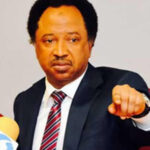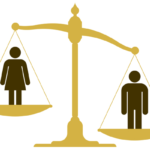By Favour Obi
In Africa, Nigeria has the highest population of educated women, but has one of the lowest participation of women in politics; which is a semiotic pointer to the discriminatory ideology inherent in ITS fledgling democracy.
In 2020, Nigeria’s female population amounted to approximately 101.67 million, while the male population amounted to approximately 104.47 million, which is a 23 per cent growth annually since 1950. This growth in population has not significantly improved the percentage of women in politics significantly.
Why FG is yet to deploy Tucano jets in N/West — Presidency
FCT teachers trained on sex education
In Nigeria girls and women have a right to engage in civil society, work with political parties, vote in elections, be nominated to government offices, serve on boards, and make their voices heard in a number of ways, but when it comes to elective positions they are denied, especially those very high decision making positions.
Women are currently protesting against the rejection of a very important bill at the National Assembly that will allow them access to 35 per cent slots in all elective positions. The rejection of that bill was as seriously brazen as it is ominous for the development of Nigeria’s democracy. It shows the parliament isn’t aware of the trend across the global political sphere.
Why does Nigeria need more women involved in all aspects of the political process including elective positions?
Women’s political participation results in tangible gains for democracy, including greater responsiveness to citizen needs, increased cooperation across party and ethnic lines, and more sustainable peace.
Women have the indissoluble gravitas to bring intelligent growth and development to policies that inspire family development, communication and knowledge growth across board.
The national average of women’s political participation in Nigeria has remained 6.7 per cent in elective and appointive positions, which is far below the Global Average of 22.5 per cent, Africa Regional Average of 23.4 per cent and West African Sub Regional average of 15 per cent.
Is asking for only 35 per cent affirmative action for women in political party administration and leadership and in appointive positions too much to demand?
Following demonstrations, three of the gender bills: a bill to expand scope of citizenship by registration; affirmative action for women in political party administration; and provision for criteria to be an indigene of a state in Nigeria, were called for rescission. Women’s voices across Nigeria were heard.
However, so much more needs to be done. Women deserve representation in politics. Women deserve equal rights. As we move closer to the 2023 elections, there is a need for reflection and action to be made. Every state and political party should drive the message that gone are the days when women were not allowed to make meaningful decisions in elective positions.
Women in Nigeria participate in voting, run for public offices and political parties at lower levels more than men. Political activism and voting are the strongest areas of women’s political participation. Yet Nigerian women are yet to be sensitized on the power they can wield.
According to a study by the United Nations “only four countries have 50 per cent or more women in parliament in single or lower houses: Rwanda with 61, Cuba with 53, Bolivia with 53 and the United Arab Emirates with 50 per cent.”
According to UN Women calculations as of September 1 2021, there are 26 women serving as Heads of State and/or Government in 24 countries. Nigeria isn’t one of them. At the current rate, gender equality in the highest positions of power will not be reached for another 130 years.
Nigeria should imitate Rwanda. The Rwandan government is set to have at least 61 per cent of its parliament members as women. On October 6, 2008, newly elected members of the Parliament of Rwanda voted into office the country’s first female speaker, Ms Mukantabama Rose. There is evidence to show that Rwanda is leading Africa and the world in women participation and in gender equality in politics. They followed a conscious policy trajectory that allows women the privilege and right to engage in governance.
In Cuba, 53 per cent of women occupy the parliamentary seats, which keeps the country at the second spot for another year. It is one of two countries from the Caribbean to make it into the IPU’s top 10 – with Grenada not far behind at number eight — and was commended by the union for achieving and maintaining gender parity.
The popular annual Women in Parliament report by the Inter-Parliamentary Union (IPU) placed the United Arab Emirates third and final country on the list to have achieved gender equality in parliament – with 50 per cent of parliamentarians being women, compared to just 20 per cent in previous years. The country made an impressive improvement, jumping from 85th in the world in 2019, to third this year. This came as a result of President Sheikh Khalifa calling for women to occupy half the parliamentary seats in 2018.
I urge President Mohammadu Buhari to follow the steps of President Sheikh Khalifa to call for women to occupy 35 to 50 per cent of parliamentary seats in Nigeria by 2023.
Obi wrote from London
 Join Daily Trust WhatsApp Community For Quick Access To News and Happenings Around You.
Join Daily Trust WhatsApp Community For Quick Access To News and Happenings Around You.


